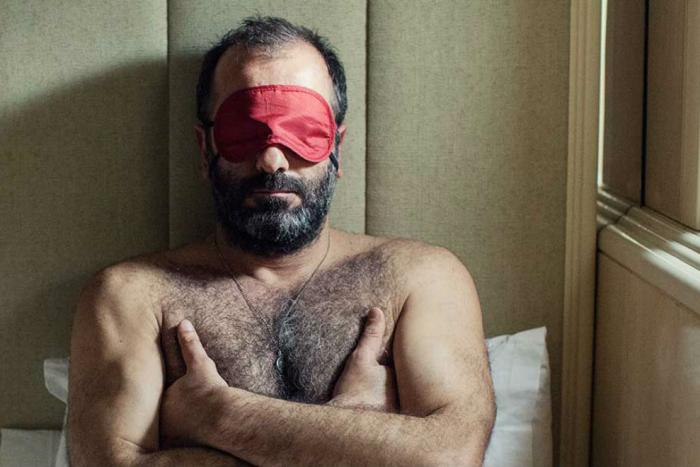Identity is an art form: filigree cut from massive chunks of barely remembered time. But eventually, deciding who you are becomes less a matter of creation than a kind of survival. It's all about avoiding despair, which often presents itself as incomprehension—doubting all of your convictions, wandering rootless in a chaos of fried rice and YouTube. When you feel implausible—like a caricature or a fraud—the only way out is discovering a self-conception, out of the many possible, that doesn't make you want to massage yourself with sandpaper. Deciding who you are is a question of choosing the most gorgeous lie.
This is why I recently visited Ariana Reines, a New York City astrologer and poet with a disarming stare, for an exhaustive three-hour session. We drank extremely complicated juice while reviewing my chart—a map of what lay behind the sky at the very moment when my head emerged from my personal amniotic muck—and pages of notes about what I should be scared of.
Ariana’s prescience upset me. She offhandedly retold much of my childhood, based on her knowledge of the planets, without my having mentioned anything about it. “You probably developed verbal abilities very quickly but everything else much more slowly,” she said. That’s true: I played words such as "bilious" in Scrabble before I had full command of a bar of soap. She rattled off a seemingly complete list of my hang ups, brought to me by the moon: “Cancers with a moon in Libra tend to prefer showing love in ways that are unrequitable.” This perspicuously describes my life of offhandedly referring to the people I love with carefully worded asides in essays, rather than just texting them, or spending hours writing short stories about them, which I delete.
Since I'm a vain person, the lies I prefer are grand. And while I’ve somewhat enjoyed the various clinically therapeutic methods I’ve tried in an attempt to explain myself to myself, I’ve decided the lie I like best is thinking my personality was constructed by interstellar forces, that my tantrums are provoked by a distant comet's small tug on my brainwaves, that the death of a small star made me chatty. In other words, of all the preposterous ways of defining oneself, I prefer astrology.
*
If you've ever done therapy, there's a good chance I could fall in love with you. Most of the people who I like have done one or another variety. There’s primal scream therapy, the kind John Lennon did, in which you try to yell the sorrows out of you and enjoy the frayed throat and mellow state of mind that follow. There’s also Cognitive Behavioural Therapy, a therapy that has a science-y feel about it, in which you document your thoughts in a notebook without wondering about, say, how they were inculcated by maltreatment at the hand of your parents. Experiential Therapy practitioners use props, encouraging patients to express their anger by swinging foam swords or throttling wet towels.
All of these involve some sort of self-absorption, and I like people who are self-absorbed like I am. Consequently, I'm always happy when a friend, returning from a therapy appointment, tells me whatever shocking revelation has restructured their inner life. However, these solemn moments make a particular demand on me, which is that I have to withhold one of my most cherished opinions: I think therapy is nonsense.
It's not that I don't believe that therapy doesn't work—I know it works, this is well documented. However, I believe in a very strange finding of psychological science called The Dodo Verdict, which indicates that therapy doesn't work for any of the reasons therapists would have you believe it does.
Therapeutic stories, or any stories about the self, I believe, are a combination of lies, simplifications, and omissions. Of course, that doesn’t mean that talking through your problems is a bad thing.
The Dodo Verdict is a counterintuitive and unexpected result of a century-long competition between different kinds of psychotherapy. During the first half of the century, therapy was synonymous with Freudian psychoanalysis, which is a form of personal fortune-telling. Even if you've never done analysis, you've probably witnessed its being mocked in pop culture, which is more or less all you need, because analysis is indistinguishable from parodies of analysis. Traditionally, this therapy takes place on an expensive leather couch in a musty office, where you ramble in the direction of a stern, mostly silent person, who eventually tells you a totally implausible story about what’s wrong with you. In Freudian terms, personality disorders stem from disruptions in stages of personal development, each of which revolve around an erogenous zone, like the anus. Much as I like the phrase "my personality problems come from the anal stage," thinking that you're an alcoholic because you never got used to your butt requires some seriously suspicious mental jiu-jitsu as far as I’m concerned.
Then came a revolution, the story goes, in the form of the aforementioned Cognitive Behavioural Therapy (CBT), which is exactly what it sounds like. This therapy, which I’ve experienced myself a few times, feels a bit like grade school for the fucked up. For example, if I were feeling terrible about my face, I would fill out some blanks in a workbook, tracing the causality of my maladaptive thoughts: when I see my face in the mirror, I think I’m the ugliest person alive, which makes me want to eat steel wool. Then, I would train myself to start thinking in a healthier way, substituting that thought about my ugliness with something to the effect of, "my face looks almost normal." Early studies of CBT were promising, showing it to be effective in relieving depression.
But then, larger studies showed something surprising: that treatments such as analysis are also effective. This 2013 study published in the American Journal of Psychiatry, for example, indicated that psychodynamic therapy (a slightly updated version of analysis) is exactly as effective as CBT in treating depression—there was nearly no difference in the results. Both sets of patients reported feeling the same attenuation of their sorrows. The only nuances occurred because of experimental bias; the studies by CBT people showed that CBT was very slightly more effective, and the opposite was true of the analysis studies done by analysis people. This result came up as well in this meta-analysis, which found, upon comparing dozens of studies on a range of cognitive therapies (therapies similar to CBT) and general-verbal therapies (therapies similar to psychoanalysis) that they were usually equally powerful. This was named The Dodo Verdict, after the dodo in Alice's Adventures in Wonderland who judges an unjudgeable race by declaring, "Everybody has won and all must have prizes."
*
The Dodo Verdict leads to two hypotheses.
The first is that all therapies work the way they say they work, and all of them are equally useful: Freud was right about development, but the CBT people were also right about the effect of maladaptive thoughts. Also, the people who do ACT—Acceptance and Commitment Therapy, the central tenet of which is basically that you shouldn’t listen to your feelings—are right that you can regard negativity as a natural mental churning, which is simply to be bulwarked by mindfulness techniques. This hypothesis says that all of these therapies grasp at different, but equally valid, mechanisms of human suffering.
But that seems much less likely than the other possible hypothesis, which is that all of the vastly different therapies work equally because they aren’t actually that different in any important way. This hypothesis says that all of the therapies work on the very simple principle that talking to someone you trust about your problems feels good, especially if they have tempting, fanciful narratives—of the Freudian kind or another—a promise of a treasure map on which the source of your sorrow could be sought. In other words, it’s all theatre.
I believe this: that most therapists are essentially witch doctors, doing real healing with illusory powers. Intuitively, I like this idea, because, the older I get, the less I believe in the accuracy of any particular diagnosis of self-identity. Therapeutic stories, or any stories about the self, I believe, are a combination of lies, simplifications, and omissions. Of course, that doesn’t mean that talking through your problems is a bad thing. The solitary confrontation of sorrow is dangerous. Also, any provisional understanding of what’s going on in your head is comforting—even if that understanding is a fiction.
*
A belief in the power of the stars seems extremely fanciful now that they’re all concealed by light pollution. But the opposite would be true if you were living in a time when night meant wondering where the wolves might reside in a thick, incurable darkness broken only by burning constellations. In those circumstances, it seems simply correct to think that the sky might possess power over you. To our knowledge, astrology first appeared in Sumeria, where predictions about the fates of crops or cities were based on the stars, supported by the examination of the livers of sacrificed goats. In medieval Europe, astrology was alternately perceived as scientific and heretical. The Muslim philosopher Avicenna wrote against astrology’s attempt to predict the will of Allah, while at the same time suggesting that Allah worked on humanity through the influence of heavenly bodies. Though Dante’s Divine Comedy is strewn with astrological references, the famous astrologer Bonatti is marooned in the eighth circle of hell with his head glued on backwards, as a punishment for his having attempted to see the future. In the 16th century, European doctors were legally required to consult the stars before puncturing their patients.
I don’t regard astrology as a science—I wouldn’t want anyone to hesitate to destroy one of my tumours because Pluto said otherwise. My view was well-stated by Kurt Vonnegut: "About astrology and palmistry: they are good because they make people feel vivid and full of possibilities. They are communism at its best. Everybody has a birthday and almost everybody has a palm."
But astrology has other advantages. It promotes a very useful habit of mind: the notion that we're formed by things much larger than ourselves. I prefer this to the more introverted view taken by other therapeutic modalities. Freudian analysis claims that my prior obsession with some nipple from my childhood is the reason I now pursue contemporary nipples. I feel I can disregard this claim with little thought. Cognitive Behavioural Therapy is all about self-determination, the way one might change oneself—and this is a little better, but I don't find it intellectually satisfying. While I think the idea that you can change your thinking completely is nice, I don't think we truly choose what we are. Meanwhile, astrology says you were sculpted by the planets. Your identity was created millions of miles away. So was your idiot co-worker's. Now, the both of you have to deal with the decisions written in the stars.
This core idea—that our circumstances are more powerful than our wills—is highly factual. Though it’s tempting to believe that murderers are people with corrupted souls, economist Rick Nevin has shown that the crime wave of the 1970s correlated eerily with the presence of lead in North American blood—the birth of new criminals abated as leaded gasoline was phased out. I’ll bet that not one of those murderers imagined that neurotoxins generated their motives; their lives were shaped beyond their comprehension. Consider also that research led by epidemiologist Sreeram Ragopian has shown that January babies are more frequently bipolar.
Again, none of this demonstrates the strict correctness of astrology—it just demonstrates that there are gigantic forces beyond our control looming behind the decisions we feel we make freely. This is what makes astrology my favourite pseudoscience—the most comforting bullshit I enjoy. It’s an attempt to grasp how we are shaped, rather than how we might attempt to shape ourselves.
At one point in our session, Ariana said, "Okay, Sasha, now I'm just going to tell you what your personality is." Isn't that what we all want? To be a whole person in someone else's eyes—to be a clear, complete picture, even for a moment? When she told me who I was, I didn't care about whether she was right—I was comforted by the fact that she was describing someone who sounded life-like. I felt like I was something I could believe in.






